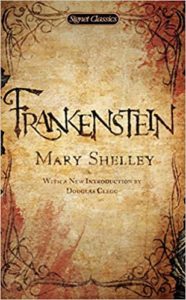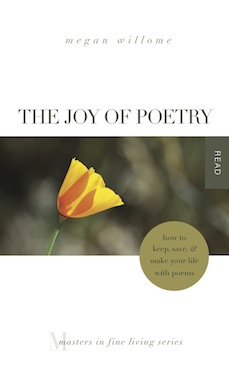
Frankenstein, by Mary Shelley
The decision of which book to read first in the new year is one I weigh carefully. For 2021, listening to a Close Reads podcast series with Karen Swallow Prior, in preparation for her new introduction and annotation of the 1818 edition, decided me: I would start the year with Mary Shelley’s Frankenstein. I’d make it my beach read.
I had read Frankenstein long ago, before I had children. Back then I was impressed that Shelly wrote a story, not just a monster.
But this time I was in despair even before reaching Victor. How could I read this story generously when all I felt was revulsion?
In the last twenty-five years I’ve had children and helped them pack and move away. I’ve buried both parents. I’ve spent many sleepless nights in worry over those I love. Where is the tenderness in this book, outside of the longing in the monster’s heart? A longing that is not fulfilled.
Then I read a post about Twelfth Night, in which Callie Feyen asked us to sit with stories that challenge us. So I plowed on through Frankenstein, as Walton plows on toward the North Pole, listening to Victor’s tale.
I found myself walking in sympathy alongside Victor’s father, Alphonse. The man is certainly not blameless, but I don’t blame him for Victor’s descent. I don’t hold the father responsible for the monster. Many things conspired to create him.
This month Tania Runyan has encouraged us to “Read a Classic, Write a Poem,” first for The Great Gatsby and then for To Kill A Mockingbird. I’ve often written poems when a book moves or inspires me (I have dozens on Kristin Lavransdatter), but I have not written a poem for a novel I am wrestling with — until now.
I decided to write a poem for Alphonse. Because toward him I feel a generosity I did not feel before I became a parent. If I read Frankenstein again, twenty-five years from now, my generosity may find another path.
When springs of existence suddenly give way
“Nothing is so painful to the human mind as a great and sudden change.”
—Victor Frankenstein, chapter 23, Frankenstein
Like the change in you, my son—
my flesh, my blood,
the one I guided with a silken cord—
when you became a monster.
What is there to say when you return
emaciated with care?
What is there to do but bail you out
again?
I thought—truly, earnestly thought—
all you needed was a wedding. She—
the delight of my eyes—she
could be that for you. True, she
is your sister, sorta.
That doesn’t mean she wouldn’t do you good.
When a parent’s mind cannot absorb
blow after blow after yet another blow
then the body gives way.
Memories strangle as surely as any fiend.
December’s Pages
Poetry
Conversations with a River, by Dianne Grammer
The Hidden Meaning of Birds: a spiritual field guide, by Arin Murphy-Hiscock (not a poetry book, but it has inspired a lot of poetry-writing)
Don’t Ask Why, by Michelle Ortega
Picture Books and Early Readers
Hello Numbers! What Can You Do?: An Adventure Beyond Counting, by Edmund Harris and Houston Hughes, illus. Brian Rea (Join us for Children’s Book Club next Friday, February 12!)
That New Animal, by Emily Jenkins, illus. Pierre Pratt (my go-to book for brand-new moms)
Toys Go Out: Being the Adventures of a Knowledgeable Stingray, a Toughy Little Buffalo, and Someone Called Plastic, by Emily Jenkins, illus. Paul O. Zelinsky (short chapter book)
Middle Grade and YA
Girls Running: All You Need to Strive, Thrive, and Run Your Best, by Melody Fairchild and Elizabeth Carey (the most body-positive how-to book I’ve ever read)
Grownups
Frankenstein, by Mary Shelley
Just Mercy, by Bryan Stevenson
Made Progress
Death Comes for the Archbishop, by Willa Cather
For Discussion
1. Has a book struck you differently on a reread?
2. What do you do when you don’t feel generous toward a story?
3. Share your January pages. Sliced, started, and abandoned are all fair game. I abandoned Spirits in bondage; a cycle of lyrics, by C.S. Lewis.
Photo by Tambako The Jaguar, Creative Commons, via Flickr. Post by Megan Willome.
Browse more Reading Generously
“Megan Willome’s The Joy of Poetry is not a long book, but it took me longer to read than I expected, because I kept stopping to savor poems and passages, to make note of books mentioned, and to compare Willome’s journey into poetry to my own. The book is many things. An unpretentious, funny, and poignant memoir. A defense of poetry, a response to literature that has touched her life, and a manual on how to write poetry. It’s also the story of a daughter who loses her mother to cancer. The author links these things into a narrative much like that of a novel. I loved this book. As soon as I finished, I began reading it again.”
—David Lee Garrison, author of Playing Bach in the D. C. Metro
- Perspective: The Two, The Only: Calvin and Hobbes - December 16, 2022
- Children’s Book Club: A Very Haunted Christmas - December 9, 2022
- By Heart: ‘The night is darkening round me’ by Emily Brontë - December 2, 2022



Glynn says
I read Shelley’s “Frankenstein” three years ago – and was surprised at how contemporary it was. I’ve read “Don Quixote” by Cervantes twice, on the advice of a teacher who said it should be read three times — once in youth, once in middle age, and once in old age. I’m waiting until I get old for my third reading. (But the teacher was right when she said your perspective and understanding of the book will change.) And I’m on my fourth reading (almost finished) of “The Lord of the Rings” trilogy by Tolkien. It’s gotten better each time I read it.
It looks like 2021 will be my year of Shakespeare – with Callie Feyen and Dave Malone, we’re embarked on a project to read all of his plays and sonnets this year. So far, I’ve kept to the schedule.
January reading:
Mystery
The Cyclist by Time Sullivan.
The Slaughterhouse Murder by Roy Lewis.
The Tattoo Murder by Roy Lewis.
A Shadowed Livery by Charlie Garratt.
Plays
Twelfth Night by William Shakespeare.
Henry VI, Part 1 by by Shakespeare.
Henry Vi, Part 2 by Shakespeare.
Henry VI, Part 3, by Shakespeare.
The Comedy of Errors by Shakespeare.
Fiction
Scattered Light: Stories by Steve Wiegenstein.
Hannah by Chris Keniston.
Manchester Christmas by John Gray.
The Ardent Swarm by Yanem Manai.
The Royal’s Best Friend by Brenna Jacobs
All That Stands Between Us by Annette Larsen.
Non-fiction
The Revolt of the Public by Martin Gurri.
The Tragedy of the Republic by Pierre Manent.
Poetry
A Litany of Flights by Laura Reece Hogan.
The Strangeness of the Good: Poems by James Matthew Wilson.
New Disease Streets by David O’Nan.
Eat the Storms by Damien Donnelly.
Transit by Kelly Belmonte and photos by Tom Darin Liskey.
Megan Willome says
Glynn, I will be hitting that second milestone with “Don Quixote”–read it in high school, in Spanish, and will be reading along this year with a podcast.
I do plan to read Karen Swallow Prior’s take on the 1818 “Frankenstein”–will not wait another 25 years.
Rick Maxson says
I took a course in college themed “Coming Home” where we read James Joyce’s Ulysses and Huckleberry Finn. I had read Twain’s book when I was much younger and I continued to love reading it I discovered. Ulysses was nothing short of a literary root canal on the first read, maybe like trying to form a plot from the phone book. I read it three times before it began to make sense. In the years since I’ve read it twice and each time enjoyed it more. There is a story and along side Joyce’s lark with language to feel generous about.
Reading
In searching for poems I came across Frances Richard and her lengthy (500 pages) research on the artist Gordon Matta-Clark of the minimalist movement. I do not read fast so it will be with me for awhile.
Poetry
The Well Speaks of Its Own Poison by Maggie Smith
Extra Hidden Life, among the Days by Brenda Hillman
In the Lateness of the World by Carolyn Forche
The Country Between Us by Carolyn Forche
Registers of Illuminated Villages by Tarfia Faizullah
A Collection of Ruth Stone What Love Comes To
Sight Lines by Arthur Sze
Olives by A. E. Stallings
God of Nothingness by Mark Wunderlich
Small Stones from the River by Kat Lehmann
In the Time of Great Fires by Alison Luterman
Bonfire Opera by Danusha Lameris
Non Fiction
First Principles by Thomas Ricks
Promised Land by Barak Obama
Megan D. Willome says
So glad you shared your list, Rick!
I don’t think I’d have the patience to read “Ulysses” three times before getting it. I’d have to like it from the start (says the woman finishing her fifth trip through “Kristin Lavransdatter.).
Bethany says
Such an interesting idea—writing a poem for a story that challenges you. At the moment, I’m challenged by how to organize a multi-faceted writing project. Maybe I should try writing a poem about it, or to it, as a way in.
Megan Willome says
Bethany, I once wrote a poem about frustrations involved in moving from one computer to another. It helped me in many ways, not the least of which was acknowledging what was behind the transfer. I’m sure working on a poem about your writing project will do you good, whether or not the poem is “good” (if that makes sense).